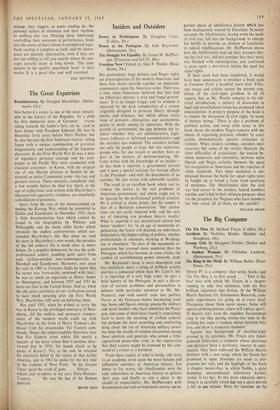The Great Expatriate
MAcAarriva's career is one of the most remark- able in the history of the Republic. As a child his first memories were of Geronim braves riding towards his father's fort, yet he .ived to have dinner with President Johnson. He was in Honolulu forty years before Pearl Harbor, but he also became the first American viceroy, ruling Japan with a unique combination of patrician magnanimity and understanding of the Japanese character. In the First World War he was a hero of legendary personal courage and his cam- paigns in the Pacific War were conducted with classical assurance : in Korea, with the surgical use of one Marine division at Inchon he de- stroyed an entire Communist army—his last and greatest victory. These memoirs, completed only a few months before he died last April, at the age of eighty-four, and written with MacArthur's characteristic egocentric vividness, are manifestly a distillation of greatness.
Apart from the tekt of the memorandunri on ending the Korean War, which he presented to Dulles and Eisenhower in December 1952, there is little documentation here which cannot be found in the biographies by Whitney and Willoughby and the many other books which chronicle the endless controversies which sur- rounded MacArthur's life. But when we read his story in MacArthur's own words, the paradox of the old soldier's life is made clear as never before. In a populist democracy he was the arch- professional soldier, standing quite apart from such civilian-minded near-contemporaries as Marshall and Eisenhower. Moreover, ever since his visit in 1905 to Curzon's India he knew that his career was 'irrevocably entwined with Asia'; he was as much an expatriate as Henry James or Hemingway, and between 1937 and 1951 he never set foot in the United States. And so, when the old, great certainties of our civilisation ceased to have much meaning after the First World War, MacArthur still went on believing them.
Not until 1951, when he wished to carry the war in Korea to the privileged sanctuary of Man- churia, did the endless and necessary compro- mises of the modern world catch up with MacArthur in the form of Harry Truman's dis- missal from his proconsular Far Eastern com- mands. Hence the understandable bitterness over that Far Eastern event which fills nearly a quarter of the book (when Bob Considine inter- viewed him in 1954, 'his hands shook as he spoke of Korea'). Yet, to the end, he retained his absolutist belief in the values of that earlier America, and in 1962 he spoke for the last time to the students of West Point: 'In my dreams I hear again the crash of guns. . . . Always . . . echoes and re-echoes in my ears, Duty-Honour- Country. . . .' He was the last of the Roman generals.
DAVID REES






































 Previous page
Previous page